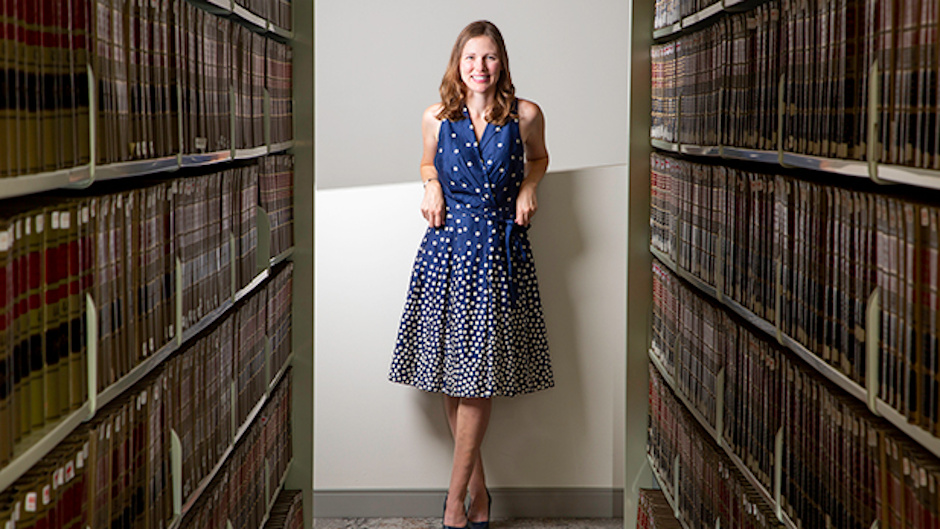Widely recognized for her knowledge of international trade law, Kathleen Claussen has guided U.S. and global policymakers, as well as Miami Law students, on the nuances of this dynamic field.
“I want our students to understand how transnational law is interwoven with every part of U.S. law,” said Claussen, associate professor of law. “Our students need to become familiar with the tools and ideas of international law to be effective advocates for their clients and informed leaders.”
Claussen recently served as an invited member on the Biden-Harris 2020-21 Transition Team, where she worked with three different agencies engaged in foreign commerce regulation to assess the state of play for the new administration on policies such as the tariffs on products from China and the so-called national security tariffs on steel and aluminum.
“It was an unexpected invitation, and I was happy to join,” she said. “Our role was to ensure that the incoming leadership could be up to speed on the issues.”
Reflecting on the multiple economic, security, and human rights issues involving China, Claussen said, “There are many concerns regarding the policies and practices of the Chinese government. The challenge for this administration is engaging China in an effective and consistent way, using the many available tools. That means thinking about interrelated issues and deploying our political capital in creative ways.”
Current Role on US-Mexico-Canada Agreement
Claussen is also one of 10 Americans appointed to the dispute settlement roster of the United States-Mexico-Canada Agreement. The USMCA, which came into force in 2020, replaces the North American Free Trade Agreement. If there is a trade dispute between the U.S., Mexico, or Canada, Claussen could be one of the individuals asked to adjudicate the matter.
Claussen is also one of two Americans selected by Canada and Mexico for their USMCA rapid response labor mechanism roster, a key tool for enforcing the agreement’s labor protections. The mechanism is the first of its kind and allows either country to take expedited enforcement action against worksites in the other country that do not comply with domestic freedom of association and collective bargaining laws.
Looking beyond the USMCA, Claussen said, “Global trade facilitates so many aspects of modern life – not always in positive ways for all people, and that still needs to be top of mind. But, in many respects, it is the fast and open movement of goods and services that defines the 21st-century global economy.”
Route to International Trade
Growing up in Kansas, Claussen planned to become a teacher. She also wanted to widen her horizons and began traveling internationally for work and study when she was 15. As a junior at Indiana University, she studied European and international law in Denmark, which helped solidify her interests in law and public service.
After earning her bachelor’s degree, Claussen traveled to Northern Ireland as a Mitchell Scholar and obtained a master’s degree from Queen’s University Belfast, followed by her juris doctor from the Yale Law School.
"My goal was to become an international law professor, where I could merge public service with academic pursuits," she said.
She clerked for Judge David F. Hamilton of the U.S. Court of Appeals for the Seventh Circuit and later became legal counsel at the Permanent Court of Arbitration in The Hague. In that role, she advised arbitrators and the organization’s secretary-general on disputes between countries and on investment and commercial arbitrations involving countries and international organizations.
In 2014, Claussen was asked to become associate general counsel at the Office of the U.S. Trade Representative in the Executive Office of the President during the Obama administration. For the next three years, she represented the United States in trade dispute proceedings and served as a legal adviser for international trade negotiations. She also worked on economic security issues as a detailee to the Federal Bureau of Investigation and the National Cyber Investigative Joint Task Force. In these capacities, she was deeply involved in labor and trade issues, as well as in national security and economic policy decision-making.
Joining the Faculty
In 2017, Claussen joined the Miami Law faculty, where she teaches international economic law, as well as civil procedure and international business and national security law.
Before the COVID-19 outbreak, Claussen would take her students to Miami International Airport for real-world experiences in the import-export sector.
"Along with understanding how trade law is made, our students need to see how international trade works in practice and why it matters so much to our economy," she said.
Claussen also wanted Miami Law students to learn about global supply chains – an issue that became more critical after the pandemic struck, causing shortages of facemasks and personal protective equipment. Now, vaccine distribution issues are another topic of international trade conversations.

